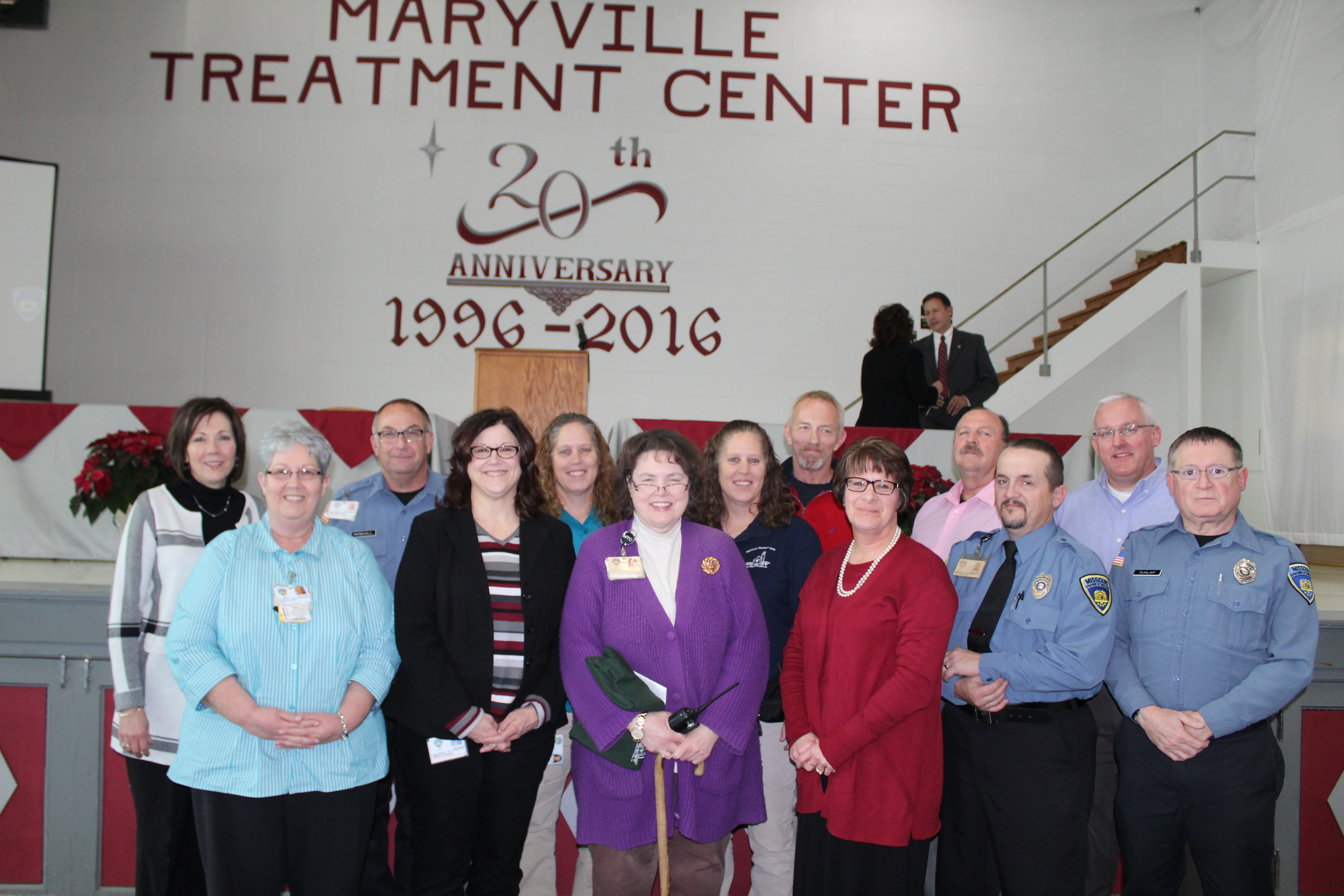
During the Maryville Treatment Center’s 20th-year celebration December 8, administrators recognized the following staff members for their 20 years of service to the facility. They are front: Judy Wonderly, Kelly Parshall, Brenda Jennings, Rhonda Steward, Jessie Privett and John Dunlap; back: Debra White, Scott Parshall, Kristy Schmitz, Amy Chor, Ralph Wallace, Tom Seipel and Kevin Shirrell. Not pictured: Sheila Sowards.
The Maryville Treatment Center celebrated its 20th year on December 8 with a commemorative ceremony.
The ceremony honored 14 staff members who have given 20 years of service to the center.
In 1995, the facility was purchased from the Sisters of St. Francis who used it as a convent and school. Currently, the campus has a 525-bed capacity with 26 overflow beds available.
The center employs 239 staff. Staff members are involved in community outreach including adopting families for Christmas and contributing to food drives, women’s shelters, Special Olympics and Relay For Life.
“It is quite an accomplishment for an institute. I am quite proud of what we do here,” Maryville Treatment Center Warden Gaye Colborn said.
Maryville Treatment Center is a prison facility that focuses on treating offenders and returning them to society. The Department of Corrections partners with The Gateway Foundation and the Department of Rehabilitation Services to provide drug abuse treatments in a therapeutic community environment, making it the only blended treatment facility in the state.
“No matter what company we work for, we are ‘Maryville’ when we walk through those doors,” Colborn said. “We are community. We have a common goal.”
Any offender can be enrolled in the treatment program regardless of their convicted crime. Offenders transfer to the center toward the end of their prison sentence and enter into either a six-month or one-year treatment program when stipulated by the court system or parole offices. Sometimes they can receive a reduction in their sentences with the completion of the treatment program.
At the center, every inmate holds a job, working as porters, in food service, training puppies for parole, with the Missouri Department of Transportation and more.
The center focuses on a range of treatments geared toward breaking addictions and changing destructive patterns, holding offenders to a higher standard of accountability than found in general population prison.
Offenders attend approximately 20 different treatment programs including anger and medication management, chemical dependency, co-occuring disorders and relapse prevention. Inside/Out Dads teaches offenders how to be fathers, interact with their children and parenting skills. Other classes include GED certification courses and employable skills such as learning to write resumes and mock interviews.
Offenders are required to attend classes and work their jobs at the treatment center or they are considered to be refusing treatment and are moved back to a general population facility.
“While they are here, they start seeing the benefits. When they leave they are generally grateful for having completed the treatment program,” Colborn stated.
Staff members help offenders to change their thinking processes by helping them to recognize and break unhealthy habits and implement new ones.
“The hard work and dedication that this group has shown in providing safety and treatment has been tremendous. I don’t think people understand how vital it is for offenders when they leave,” Colborn said. “We give them a tool box full of tools to use on the outside. I want to let the community know why we are here and what we stand for. The treatment absolutely helps.”
In his presentation, Missouri Department of Corrections Director George Lombardi said that by helping offenders, staff not only saves the offender’s life, but saves the lives of the offender’s family. They help a father be a father and possibly prevent future crimes. He believes the main quality offenders are missing is compassion, either because they never had it or because they lost it as a child. He urged staff to continue showing compassion toward the offenders so that they can learn compassion by example.
“What makes this facility so good is the staff at Maryville. They are outstanding,” Lombardi said.




Facebook Comments